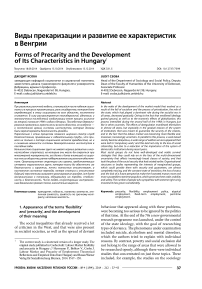Forms of precarity and the development of its characteristics in Hungary
Автор: Csoba Ju.
Журнал: Уровень жизни населения регионов России @vcugjournal
Рубрика: Неустойчивая занятость
Статья в выпуске: 4 (194), 2014 года.
Бесплатный доступ
In the wake of the development of the market model that evolved as a result of the fall of socialism and the process of privatisation, the role of the state, which had played a dominant role during the socialist era in all areas, decreased gradually. Owing to the fact that neoliberal ideology gained ground, as well as to the economic effects of globalisation, this process intensified during the second half of the 1990s in Hungary just like in other countries. The effects of deregulation manifested themselves in almost all areas, but especially in the gradual erosion of the system of institutions that was meant to guarantee the security of the citizens, and in the fact that the labour market was becoming more flexible and, moreover, increasingly uncertain. In parallel to this process, a work-based society became ubiquitous, a wide range of welfare services appeared that were tied to ‘compulsory work,’ and this lead not only to the loss of social citizenship, but also to a reduction of the importance of the system of democratic institutions during recent years. Most social groups do not have well-developed and viable survival strategies that they could rely on in the face of the multi-dimensional uncertainty that affects increasingly broad classes of society, and that took the place of the social security that had existed earlier. Organisational structures or bodies representing the interests of marginalised groups, which could provide them with security and guarantees, are almost completely missing, and the constant state of transition, the loss of status and the lack of a future perspective make the frustrated masses more and more susceptible to extreme populism, which promises them order, stability and safety. The number of people who sympathise with extreme right-wing movements has grown considerably.
Flexibility, employment policy, atypical employment, fixed-term employment, part-time employment
Короткий адрес: https://sciup.org/143182052
IDR: 143182052
Список литературы Forms of precarity and the development of its characteristics in Hungary
- Kapitalismus ohne Arbeit. Der Spiegel. 50. évf. 20. sz. 140-146.
- Castel, Robert (1998): A szociális kérdés alakváltozásai Max Weber Alapítvány-Wesley Zsuzsanna Alapítvány Kávé Kiadó, Budapest.
- Csoba Judit (2001): A teljes foglalkoztatás alternatívái Valóság XLIV. 9. 110-115.
- Csoba Judit (2010): A tisztes munka L’Harmattan Kiadó, Budapest.
- Csoba Judit (2010a):„Do the Unemployed want to Work?»Employee Ability and the Willlngess of the Unemployed Corvinus Journal of Sociology and Social Policy Vol. 1 2, 89-107.


